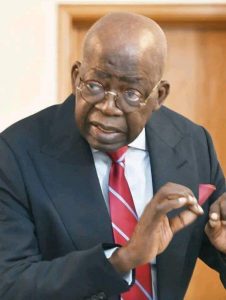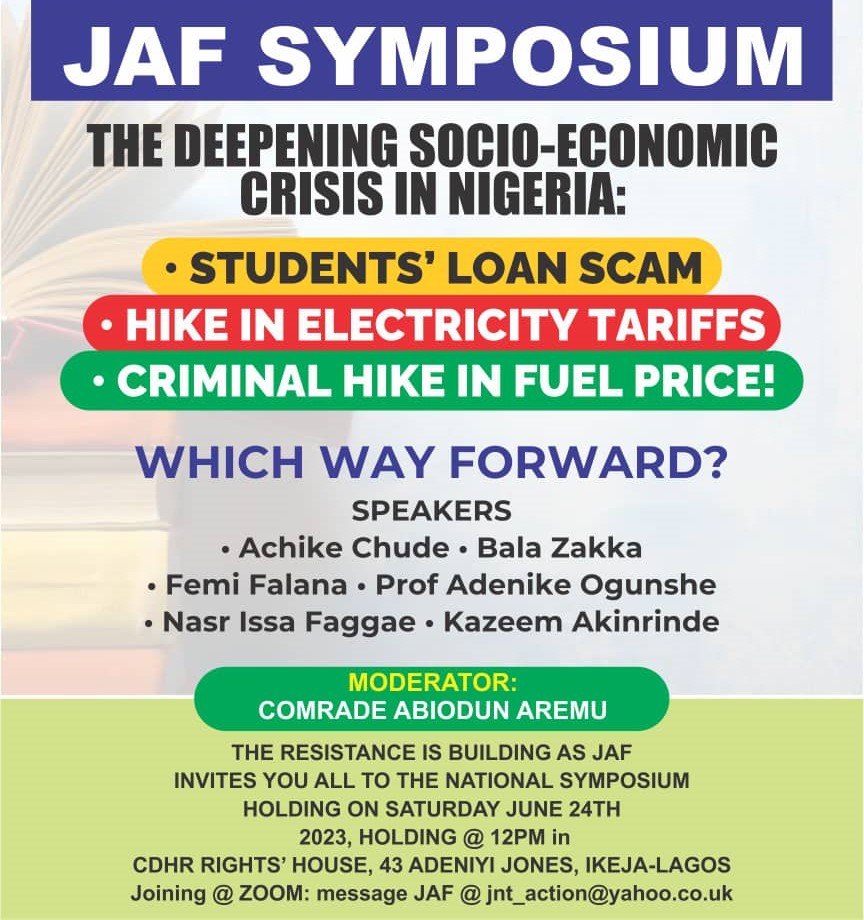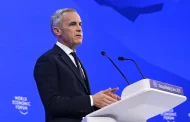It could be the calm before the storm as one of the more consistent radical platforms in Nigeria is busy organising. In contrast to majority of the hegemonic neoliberal oriented civil society organisations, the Joint Action Front (JAF) still speaks the language of the Marxism of the Second International and about which it has no apologies.
On July 22nd, 2023 when the Tinubu administration was issuing a statement through the Secretary to the Government of the Federation obviously aimed at calming tempers, JAF was coordinating a nationwide mass meeting on the ‘State of the Nation and the Way Forward’ regarding what it calls “the continuous, wicked hike in the prices of petroleum products”.
JAF Secretary, Comrade Abiodun Aremu, who issued the statement is a veteran of the struggle for new social order or a socialist revolution in Nigeria. A social revolt against a particular policy or what is known as episodic struggles has been defining of the politics of the radical tradition in Nigeria. What is not clear is whether JAF has overcome the problems associated with that pattern of struggle.

The FG has radicalised the masses with its subsidy withdrawal policy
The difference in this case is that JAF does not need to do much in terms of conscientizing the potential demonstrators. The dramatic removal of the much contested fuel subsidy and the suffering it has brought on the people has radicalised its victims into a ready-made constituency of demonstrators. It looks like as long as the subsidy remain withdrawn without a sufficiently compensatory alternative, this will be the situation.
In that case, pundits are speculating whether the president has not misled himself into thinking that the radical constituency he knows very well is incapable of sustaining a damaging standoff against his government. The problem with such thinking, if that is, indeed, what the president is thinking, is that a radical-organised outpouring of protesters of any significance will throw the country into a really aggravated radical contingency. According to pundits, that is because it will add to a deadly power struggle which has since moved from the electoral to the judicial phase. The two will add to a high degree of fragmentation of elite fragmentation never seen in this country.

Peter Obi divided the Left the same way Tinubu did
President Tinubu is obviously not ignorant of this scenario. It is not for nothing that he has smartly been building a hegemonic coalition, playing host to all manner of presidential visitors, trying to connect to Africa, the ECOWAS and the larger international community and so on. The problem is that he has yet to win the narrative warfare on the outcome of the presidential election, notwithstanding the hyperactive presence of his media team. Once a Government is on the losing side of discursive power, it is in deep trouble. The second one is that the forces fighting him are well established, with some of them listed as individual republics in the Nigerian system. There are inherited problems such as the perceived level of corruption and waste in running Government and the way operatives flaunt affluence callously in a country where millions go to bed hungry. To make matters worse, the president is believed in many quarters, some of them friendly quarters to have read just the wrong speech on inauguration Day. “He did not read the speech that would have melted minds for him”, said an elderly observer who is not really interested in much of the controversies but interested in what is delivered by whoever governs.
The subsequent conclusion after the inauguration speech has been that the president is dancing to an alien drummer with whom he is in agreement to further dehumanise the population. As perceptions do not need proof because they move human beings to act, there lies the origin of the president’s loss of hegemony which the inauguration speech could have helped to stabilise. The radical outpouring against the regime which seems most likely would be such an interesting paradox. Although President Tinubu has never pretended to be a socialist, he is the politician of his stature with the closest communion with the radical constituency across the country. The only other politician, outside of the democratic minded middle class professionals, would be the late General Shehu Yar’Adua (late President Umaru Yar’Adua’s senior brother). Even the former NANS president that Atiku Abubakar was able to work with was inherited from General Shehu Yar’Adua. It doesn’t make the late General a radical but it makes him one of the few members of the power elite in Nigeria with the sophistication to appreciate that it is a dangerous one-dimensional sense of security for the bourgeoisie not to fund popular struggle. Tragically, he didn’t benefit from civil society activism when he needed it, partly because the Abacha regime was a tough one for NGOs too and partly because many people in Nigeria have a rigid, territorialised sense of people.

Embattled ‘comrade’ Tinubu
Similarly, President Tinubu in his 30 years of NADECO activism built a hegemonic coalition which embedded non-identical elements from traditional rulers to merchants to politicians to students leaders. Today, there are no less than two former presidents of the old National Association of Nigerian Students (NANS) who are players in their own right in the president’s party. There are many others. It is unusual. As mentioned earlier, only Atiku Abubakar has worked with a former president of NANS which he inherited from Gen Yar’Adua. Former national leaders of NANS of those years are assets for any serious politician. Unfortunately, ‘Comrade’ Tinubu has now committed ‘class suicide’ so to say by going to government to multiply fuel price beyond the reach of anyone else. The statement he issued in support of a paralysing outpouring against the Goodluck Jonathan Government in January 202 has resurfaced. Although the statement cannot be used against him because every statement is contingent, it can, nevertheless, be re-interpreted against him. So, this should be the most interesting confrontation to watch if the confrontation were sure to remain entertaining. But, would it?
It seems President Tinubu is going to be a problem for the radicals as a president. Already, his candidacy and that of Peter Obi in the 2023 presidential contest has devastated radical politics in Nigeria. The candidature of each of the two had its own ripples within the Left. The Left is not a homogenous entity. There are those opposed to him within that ensemble too just as there are those strongly for him. In a test of strength within the Left, Tinubu will have his own sympathisers.
It is the same thing with Peter Obi factor. Obi’s successful take-over of the Labour Party (LP) remains a mystery. The Labour Party is not just any party but a socialist platform. What was a non-socialist doing there? The speed with which Obi arrived there was, however, so fast that it caught everyone off guard. It remains a sore point but there will also be a serious division today should there be a test to determine those for and those against Obi within the Left. That is the sense in which the 2023 presidential candidacy of Bola Tinubu and Peter Obi devastated what was left of the Left. Their impact on Left coherence has been further worsened by the Yoruba-Igbo spat during the election.
What does not seem clear is how well all the parties to the current stalemate appreciate that, in a radical contingency, all that is solid can melt and liquid can turn into iron. Is it possible that those beating the drum for the president are assure that they are on top of the situation? Is it possible the president himself is so tense he cannot strike a better balance? Is Nigeria being set up? Has the president got a joker in there? Could the ministerial list be that joker? Is it possible the ministerial list would be such as to undo the damage the inaugural speech did? That is the list being composed as to melt souls for the president and his government? Questions! Questions !! Questions!!!




























